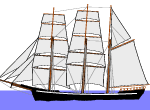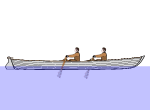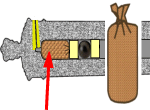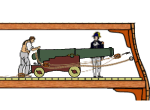
Glossaire anglais-français des termes de la marine ancienne 1780-1830
| A | B | C | D | E | F | G | H | I | J | K | L |
| M | N | O | P | Q | R | S-Sh | Si-Sz | T | U | V | WXYZ |
 |
 |
 |
 |
| W - dictionnaire anglais-français des termes marins, à l’intention des amateurs des romans historiques 1780-1830 | ||
| wad (rammed into barrel of firearm after the charge, to keep it in place) | valet à canon (nm), bourre (nf), ce qu'on met par-dessus la charge des armes à feu pour la retenir | |
| wad-hook, worm - see cannon | tire-bourre - voir canon | |
| waist (middle section of the top deck of a ship) | embelle (nf, milieu du pont supérieur d'un navire) | |
| wake (trail left by boat or ship) | sillage (nm, trace marquant le passage d'un bateau ou navire) | |
| wardroom (the officers' common room and dining area) | carré des officiers (nm, la pièce commune et salle à manger des officiers) | |
| warning shot | coup de semonce, coup d'avertissement | |
| to warp (to move a ship by hauling on a rope attached to an anchor or some fixed point) | touer (v, faire avancer un navire en tirant sur un câble amarré sur l’ancre de touée ou sur un point fixe) | |
| watch: (1) period of four hours during which a sailor or officer is on duty; the seaman's equivalent of a shift (2) crew-members who are on duty at the same time |
quart (nm): (1) période de quatre heures pendant laquelle un matelot ou un officier est de service (2) fraction de l'équipage qui assure ce service |
|
| watch bill (a list of the crew divided into their various watches) | rôle de quart (liste des hommes qui doivent faire quart) | |
| watch > anchor watch | quart au mouillage, quart de rade | |
| watch > on watch | de quart | |
| watch > officer of the watch | chef de quart | |
| watch > the watch below (the sailors who are off duty) | le quart d'en bas (les matelots qui ne sont pas de service) | |
| watch > dog watch (work shift lasting only two hours) | petit quart (quart qui ne dure que deux heures) | |
| watch > the starboard watch / the port watch | la bordée tribord / la bordée bâbord | |
| water, fresh | eau douce (nf) | |
| waterline (line where the surface of the water meets a ship’s hull) | flottaison (nf, la ligne de flottaison. Jonction de la surface de l'eau avec la coque du navire) | |
| wave | vague, lame (nf) | |
| way (momentum, which keeps a ship moving after its sails have been taken in) | erre (nf, lancée que garde un bateau quand on a amené ses voiles) | |
| way > steerage way (enough speed through the water for the rudder blade to steer the ship effectively) | erre de gouverne (assez de vitesse de surface pour que le safran du gouvernail puisse diriger le navire) | |
| way > to lose all way (to come to a halt, by reference to the surface of the water) | casser son erre (s’immobiliser complètement par rapport à la surface de l'eau) | |
| way > to gather way (to increase speed through the water) | prendre de l'erre (prendre de la vitesse de surface) | |
| way > a ship that has no way on | un navire sans erre | |
| weapon > edged weapons (see bayonet, boarding axe, cutlass, dirk, half-pike, pike and sword) |
arme blanche (voir baïonnette, hache d'abordage, coutelas, sabre d'abordage, poignard, esponton, pique et épée) | |
| weapon > firearm (see cannon, musket and pistol) | arme à feu (nf, voir canon, mousquet et pistolet) | |
| to wear - see go about > to wear ship | virer de bord vent arrière - voir virer > virer lof pour lof | |
| weather - see also wind (1) fine weather, fair weather (2) bad weather, heavy weather (3) (adj) windward (4) (v) "She's weathering on us"; she's going faster to windward than we are. |
temps (nm) - voir aussi vent (1) beau temps, clair temps (2) mauvais temps, gros temps (3) au vent (4) gagner au vent (v, « Elle gagne au vent par rapport à nous ») |
|
| weather gage of an enemy ship, to have the (to be upwind of it) | avoir l'avantage du vent, être au lof de l'ennemi, avoir le vent sur l'ennemi | |
| weather gauge of an enemy ship, to have the (to be upwind of it) | avoir l'avantage du vent, être au lof de l'ennemi, avoir le vent sur l'ennemi | |
| to get the weather gage/gauge of an enemy ship (to get to windward of it) | gagner l'avantage du vent sur un vaisseau ennemi | |
| weather helm, griping (tendency of a sailing vessel to turn upwind rather than stay on course. See also lee helm) | ardent (adj, se dit d’un voilier ayant tendance à lofer plutôt qu’à garder son cap. Voir aussi mou) | |
| "weevil" (insect larvae which tunnel inside ship's biscuit, usually those of the bread beetle, Stegobium paniceum) | « charançon » (nm, insecte dont les larves creusent le biscuit de mer, normalement la vrillette du pain, Stegobium paniceum) | |
| well (wooden structure in the form of a box which surrounds the pumps and extends from the bottom of the bilges up to the main deck) | archi-pompe, archipompe (nf, construction en forme de caisse qui entoure les pompes et s'élève du fond de la cale jusqu'au premier pont) | |
| west - see compass rose | ouest - voir rose des vents | |
| westerlies (the anti-trades; the prevailing westerly winds that blow in northern waters. See also trade winds and roaring forties) | contre-alizés (nmpl, vents dominants d'ouest soufflant dans les régions boréales. Voir aussi alizés et quarantièmes rugissants) | |
| wharf, quay | quai (nm) | |
| wheel (ship’s wheel) | barre à roue (d'un navire) | |
| wherry: (1) sailing barge (large river boat with flat bottom. See vessel comparison chart) (2) waterman's boat (a long, lightweight rowing boat, arranged for two oarsmen) |
|
(1) chaland à voile (grand bateau fluvial à fond plat. Voir tableau comparatif des bâtiments) (2) barque de passeur; canot à rames, léger et allongé, prévu pour deux rameurs |
| whip (a tackle consisting of a fall rove through a single standing block, used for hoisting light objects) | cartahu (nm, cordage volant, sans affectation spéciale, passant par une poulie simple et destiné à hisser des objets légers) | |
| whip > double whip (a fall secured at one end and rove through a single standing block, the object to be lifted being attached to a single running block. See also tackle) | cartahu double (palan simple, l'objet à soulever étant alors croché dans une deuxième poulie, mobile) | |
| whip > "to reeve a whip through the block at the main yardarm" | « passer un cartahu dans la poulie de la fusée de vergue du grand mât» | |
| whistle (bosun's whistle, bosun's call) | sifflet de manœuvre (nm) | |
| wind (see also anti-trades, points of sailing, roaring forties, trade winds and weather gage/gauge) | vent (nm, voir aussi contre-alizés, allures, quarantièmes rugissants, alizés et vent > avoir l'avantage du vent) | |
| wind > leeward (downwind), the leeward side (the side furthest away from the wind) | sous le vent, le côté sous le vent (le côté le plus éloigné du vent) | |
| wind > windward | au vent | |
| wind > wind on the beam (from the side) | vent de côté, vent de travers | |
| wind > quartering wind, wind from the quarter | vent de quartier | |
| wind > wind astern | vent arrière | |
| wind > with the wind astern | par vent arrière | |
| wind > head to wind (boat or ship pointing directly upwind) | dans le lit du vent (face au vent, la position en drapeau) | |
| wind > headwind, wind from ahead (a vessel is head to wind when its bow points in the direction from which the wind is blowing) | vent debout (un voilier est vent debout quand sa proue se trouve dans la direction d’où souffle le vent) | |
| wind > foul wind. "The wind is foul for a tack to port." | vent contraire. «Le vent n'est pas favorable pour virer sur bâbord.» | |
| wind > backing wind (the wind backs when it changes direction counter-clockwise). See also wind > veering | vent reculant, retournant ou revenant (le vent revient ou recule lorsque sa direction varie selon le sens inverse des aiguilles d'une montre). Voir aussi vent > virant | |
| wind > backing > "The wind had backed southerly." | «Le vent avait reculé au sud.» | |
| wind > veering wind (the wind veers when it changes direction clockwise). See also wind > backing | vent virant, tournant (le vent vire lorsque sa direction varie selon le sens des aiguilles d'une montre). Voir aussi vent > reculant | |
| wind > Beaufort scale (1805) : | échelle de Beaufort (1805) : | |
| wind > Beaufort 0 - calm | Beaufort 0 - calme | |
| wind > Beaufort 1 - light air | Beaufort 1 - très légère brise | |
| wind > Beaufort 2 - light breeze | Beaufort 2 - légère brise | |
| wind > Beaufort 3 - gentle breeze | Beaufort 3 - petite brise | |
| wind > Beaufort 4 - moderate breeze | Beaufort 4 - jolie brise | |
| wind > Beaufort 5 - fresh breeze | Beaufort 5 - bonne brise | |
| wind > Beaufort 6 - strong breeze | Beaufort 6 - vent frais | |
| wind > Beaufort 7 - near gale | Beaufort 7 - grand frais | |
| wind > Beaufort 8 - fresh gale | Beaufort 8 - coup de vent | |
| wind > Beaufort 9 - strong gale | Beaufort 9 - fort coup de vent | |
| wind > Beaufort 10 - storm, whole gale | Beaufort 10 - tempête | |
| wind > Beaufort 11 - violent storm | Beaufort 11 - violente tempête | |
| wind > Beaufort 12 - hurricane | Beaufort 12 - ouragan | |
| wind > other: | autres: | |
| wind > breeze | brise (nf) | |
| wind > land breeze (night-time wind powered wind > by convection currents which arise when the temperature of the sea is higher than that of the adjoining land) | brise de terre (vent de convection qui souffle de la terre à la mer pendant la nuit quand la température de l'eau dépasse celle de la terre avoisinante) | |
| wind > sea breeze (daytime wind powered by convection currents which arise when the temperature of the land is higher than that of the sea) | brise de mer (vent de convection qui souffle de la mer à la terre pendant le jour quand la température de la terre dépasse celle de l'eau) | |
| wind > flaw (sudden but temporary increase in wind speed; less violent and longer-lasting than a squall) | bourrasque, risée (nf, augmentation soudaine mais brève de la vitesse du vent; moins violente et plus durable que la rafale) | |
| wind > lull | accalmie (nf) | |
| wind > puff of wind | bouffée de vent | |
| wind > squall (sudden severe increase in wind strength, with a marked change in direction of 45 to 90°, lasting only a few minutes. Wind speeds may be more than 50% that either side of the squall) | grain, rafale (renforcement brutal mais brève du vent, avec un net changement de direction (45 à 90°), et qui ne dure que quelques minutes. Une rafale peut atteindre une vitesse supérieure de 50 % à celle du vent moyen) | |
| windlass | guindeau, guindaut (nm) | |
| worm, wad-hook- see cannon | tire-bourre - voir canon | |
| to wring (said of a spar that is twisted and weakened - see mast > strained mast) | consentir (v, forcer; se dit d’un espar tordu et affaibli - voir mât consenti) | |
| wrung mast - see mast > strained mast) | mât tordu, mât forcé, mât déjeté - voir mât consenti | |
| X - dictionnaire anglais-français des termes marins, à l’intention des amateurs des romans historiques 1780-1830 | ||
| xebec (small merchant vessel with three one-piece masts carrying lateen sails. See vessel comparison chart) | chebec (nm, petit bâtiment marchand; trois mâts à pible, et des voiles latines. Voir tableau comparatif des bâtiments) | |
| Y - dictionnaire anglais-français des termes marins, à l’intention des amateurs des romans historiques 1780-1830 | ||
| yard (cylindrical spar, tapering at the ends, which is placed horizontally with its centre against a mast and used to support the sail which is fixed to it. It is also used to alter the angle the sail makes with the wind. The yards are fixed in the middle in such a way that they can be raised and lowered. Much of the running rigging runs to and from the yards) | vergue (nf, espar cylindrique, effilé à ses extrémités, placé en travers du mât, servant à soutenir et orienter la voile qui y est fixée. Les vergues sont fixées en leur milieu de façon à ce que l’on puisse en ajuster la hauteur. Elles sont le point de départ et d’arrivée de nombreux cordages qui servent à la manœuvre) | |
| yard > main yard | grande vergue | |
| yard > main topsail yard | vergue du grand hunier | |
| yard > main topgallant yard | vergue du grand perroquet | |
| yard > to have the yards across (to be ready to make sail) | vergues croisées, avoir les (être prêt à faire voile) | |
| yardarm (the outer ends of the yards) | fusée de vergue (nf, partie des vergues les plus à l’extérieur) | |
| yaw (of a ship, rotation around the vertical axis; a turn to the right or left. Une embardée is usually a sudden change of course, or the bow sheering from side to side. See also pitch and roll) | embardée (nf, d'un navire, mouvement de rotation autour de l'axe vertical; mouvement en lacets. Faire une embardée signifie dévier brusquement de sa trajectoire de manière imprévue, faire un écart latéral. Voir aussi tangage et roulis) | |
| to yaw | embarder (v, faire une embardée) | |
| Z - dictionnaire anglais-français des termes marins, à l’intention des amateurs des romans historiques 1780-1830 | ||